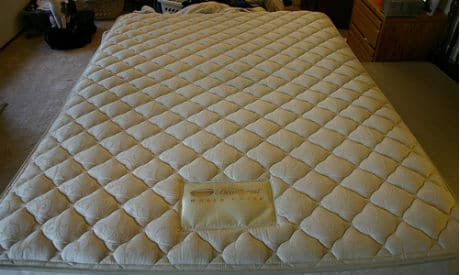
Sound sleep is integral to a healthy body, but what you sleep on might be one of the most dangerous items in your home.
Most mattresses are made with chemical toxins that emit volatile organic compounds (VOCs) and can cause respiratory problems and possibly even cancer.
As more consumers demand full disclosure of ingredients in food and products, awareness of the dangers to human health and the impact on the environment caused by the the substances used to make mattresses is increasing.
A study published in the Archives of Environmental Health proved that mattresses can lead to changes in breathing and respiratory problems – at least in mice. Groups of mice were exposed to various brands of crib mattresses (yup, the kind our newborn babies sleep on!) for two 1-hour periods. All the mattresses caused upper and lower respiratory irritation, but the biggest respiratory problems occured with the polyurothane foam pad covered with vinyl.
Most mattresses and mattress covers are made of polyurethane foam, a petroleum-based material that emits volatile organic compounds (VOCs) that affects indoor air quality over a long period of time.
Since polyurethane is highly flammable, by law, many companies also addflame retardant chemicals which are linked to nervous system disorders and are so dangerous to human health, People for Clean Beds states that "your risk of dying from toxic chemicals is greater than your risk of dying in a car accident." The law is in place to prevent the one in a million risk of dying in a mattress fire.
When you consider that a third of your life is spent sleeping, this issue begins to sound like a nightmare. It gets worse.
In May 2012, Barrons.com reported that memory-foam mattresses are the "fastest-growing segment of the $4.6 billion wholesale market for U.S. mattresses. Memory foam's market share has shot up from 14% to nearly 20% in just the past eight years." "Sex or Sleep?" by Miriam Gottfried, May 14, 2012.
This is not good news when you consider that there are up to 61 chemicals in your average memory foam mattress.
The internet is teeming with accounts of respiratory problems developing within hours of sleeping on a memory foam mattress.
Mattress manufacturers use glues (adhesives) to bond the inner layers together and to bond the fabric cover to the core.The adhesives found in memory foam mattresses include acetone, chloroform, cyanide, formaldehyde which has been linked to asthma, allergies, and lung, nose, and throat cancers, methylbenzene (toluene), and the herbicide polychlorinated phenols, just to name a few.
What about mattress covers? These are often recommended to control bed bugs and reportedly reduce the risk of crib death (SIDS) in children. Mattress covers contain PVC and phthalates, chemicals that have been linked to infertility. Luckily, there are many good options for mattress covers made with natural and organic materials.
Healthy Child Healthy World suggests that when you purchase a new mattress, whether it be for babies, kids or adults, allow it to “off-gas” outdoors until noticeable fumes have dissipated. Top it with a mattress cover made from natural fibers – wool, organic cotton or polyethylene to further protect you.
The best option, however, is to purchase mattresses made from natural materials. A healthy bed is an important investment – perhaps just as significant as buying healthy food. Do your research, and don't expect the retailer to provide any details since mattresses require no labeling. Instead, call the manufacturer to obtain a list of the materials used in all parts of the mattress and ask what they use as a flame retardant. Organic mattresses are widely available, and if you have fallen in love with the comfort of memory foam, check out Essentia, who make safe mattresses from their own chemical-free memory foam materials..
Photo credit: jzawodn










